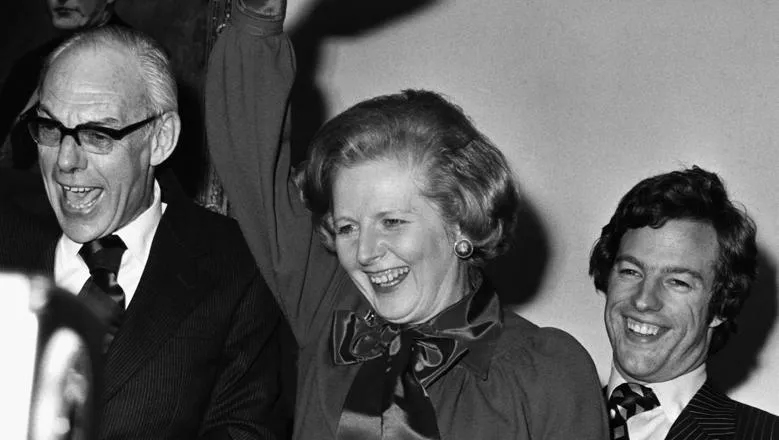Thatcher herself seems to have thought, until quite shortly before the leadership election, that she could aim no higher than being Chancellor of the Exchequer.
Richard Vinen, Professor of History
11 February 2020
Reflecting on the 45th anniversary of Margaret Thatcher becoming the first female leader of the Conservative Party
Richard Vinen
Margaret Thatcher became leader of the Conservative Party on 11 February 1975 (forty-five years ago).

Margaret Thatcher became leader of the Conservative Party on 11 February 1975 (forty-five years ago). In some ways, this was a more momentous event than the 1979 election, which brought the first Thatcher government to power. For a start, the 1975 leadership context (unlike the 1979 general election) produced a surprise.
Thatcher was not expected to win. She had been a Cabinet minister for only a few years and the office that she had held, Education Secretary, was seen as a traditional one for women.
Most importantly, Thatcher had no experience of foreign and defence policy (crucial areas for a prime minister). The latter was particularly important because Britain in the 1970s was still governed by the generation that had been formed by the Second World War.
Edward Heath (who Thatcher had challenged for the leadership) had been a lieutenant colonel. The Conservative front bench was full of men – such as William Whitelaw or Lord Carrington – who had won medals for gallantry.
Historical curiosity or a shift in attitudes to women in Britain?
This tied in with a wider point. The political establishment in 1975 was, to an extent that is hard to recapture now, almost exclusively male. Schools (at least the schools at which Tory ministers were educated) were single sex and the political clubs in which plots were hatched were all male.
It was, indeed, this clubby, male camaraderie that made all Thatcher’s potential rivals for the party leadership reluctant to challenge Heath in the first round of the leadership election and it was this hesitation that gave Thatcher her chance.
Other, more established candidates, entered the contest in the second round, after Heath had stood down, but, by then, Thatcher had established her position.
As a female leader of the Conservative Party, Thatcher was, at first, remarkably vulnerable: she was still a long way from being the confident and powerful figure that she would become after the Falklands War of 1982.
Some assumed that Thatcher would, in due course, be deposed by the patrician men who still controlled her party. Many talked as though there was something incongruous about the mere idea of a woman party leader.
When Thatcher complained about the ‘avuncular flannel’ of Jim Callaghan, the Labour prime minister, Callaghan replied that he had difficulty in imagining her as his niece. Many of the jokes about Thatcher were nastier and less amusing.
Thatcher came to power at a moment when many talked of ‘women’s liberation’ - Thatcher herself always used the rather derogatory abbreviation ‘women’s lib’.
This was the decade in which Germaine Greer’s Female Eunuch became a best-seller. But Thatcher – always carefully coiffured, never seen in public wearing trousers and speaking with a voice that seemed almost painfully careful – seemed to be the embodiment of everything that women’s liberation was against.
Thatcher’s victory in the Conservative leadership election seems, in retrospect, like the moment when Britain turned away from governments that had attempted to manage the economy or to appease the trade unions.
At the time, though, it was far from clear how far Thatcher would be able, or would wish, to deliver on the promises of some of her radical supporters.
In the short term, the most striking thing about the new party leader was simply her sex and the way in which she presented herself in this domain was a portent of her remarkable ability to make those who dealt with her (from both sides of any debate) feel uncomfortable.
Professor Richard Vinen specialises in twentieth century history and is the author of Thatcher's Britain.
December 2020 will mark the Anniversary of the fall of Margaret Thatcher, coinciding with the end of the post-Brexit transition period.

